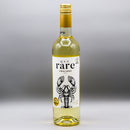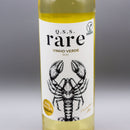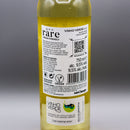Description
Q.S.S. rare Rose
Syrah and Touriga Nacional blend. Grapes grown at different altitudes on the Arruda dos Vinhos slopes, where the warmth of the hot valleys is appeased by the cool Atlantic breeze. Clay-limestone soils.
Light rosy colored wine, with notes of dried flowers, raspberries and faintly spicy. The palate is tasty, smooth, and fresh.
Q.S.S. rare
A Unique Combination
The perfect union between the wines of Quinta de S. Sebastião, with more than 300 years of tradition in wine production in Arruda dos Vinhos, and a cause, the endangered animals!
The most recent wines from Quinta de S. Sebastião, QSS Rare range, were born combining two purposes: to offer vibrant and modern wines produced in a millenary terroir and to support organizations that are in the front line in the important fight against the extinction of species that are currently endangered, drawing the consumer's attention to this very worrying issue.
Wines
These are wines produced in Arruda dos Vinhos, a Lisbon sub-region with a millenary tradition in wine production. Our vineyards are located on gentle slopes with altitudes ranging from 100 to 250 meters. They benefit from excellent sun exposure and a climate slightly tempered by the Atlantic Ocean, which is located about 35 km from our properties. Our vineyards' soils are predominantly clay-limestone.
LPN
The League for the Protection of Nature (LPN) is an Environmental Non-Governmental Organization (ENGO) of national scope and public utility. With over 70 years of existence, the LPN is the oldest environmental protection association in the Iberian Peninsula.
Its mission is to contribute to the Preservation of Nature and to Environmental Protection, with a view to sustainable development, ensuring a quality of life for current and future generations.
The LPN develops various types of activities at national, regional, and local level, including the monitoring of public environmental policy, civic intervention through projects of Nature and Environmental Conservation, Research, Training, Education and Environmental Awareness.
Many awards and distinctions have already been awarded to the LPN, such as the Order of Infante Dom Henrique (1994), the Order of Merit (1998) and the title of Honorary Member of the Order of Public Instruction (2018).
Seahorse
Seahorse
At least two species: Hippocampus guttulatus (Long-snouted seahorse) and Hippocampus hippocampus (Short-snouted seahorse)
Small marine fish that can reach 15 cm in length. Its head, with a long snout, resembles that of a horse (hence its name). They have a prehensile tail that they use to anchor themselves to plants or animals, such as corals, where they camouflage perfectly.
It is the males who get “pregnant”. They have a pouch in their abdomen, a kind of marsupium, where the females lay their eggs and where the males carry them until the birth of the babies, miniature seahorses, which emerge from the pouch already swimming!
Seahorses are particularly vulnerable species. To the unique aspects of their biology (low mobility, great dependence on habitat), we can add the fact that they live in shallow areas, near centers of human activity, where various types of pressures and threats accumulate, such as environmental degradation and their capture directed for use in traditional medicines and as aquarium fish.
In the year 2000, Ria Formosa was the area with the highest population density of these species in the world. Less than 10 years later, the population has been reduced to less than 10%, but it has shown some recovery in the meantime. Although the exact causes of this dramatic decrease are not known, it may have resulted from an overlap of factors such as underwater noise pollution, environmental degradation, fishing, among others.
https://qssrare.com/indexen.html#&gid=1&pid=1
Payment & Security
Your payment information is processed securely. We do not store credit card details nor have access to your credit card information.






